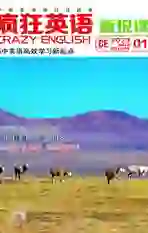我的第一个家
2023-05-30AnnaSewell
Anna Sewell
安娜·塞維尔于1820年生于英国诺福克,于1878年去世。出于对人类虐待动物的强烈不满,她写下了《黑骏马》,以说服人们对马仁慈一些。《黑骏马》是她身患重病的时候花了6年的时间写的,也是她写的唯一一本书。《黑骏马》出版后不久她就去世了,从那时以来这本书销售了3,000多万本。
在19世纪70年代,有很多活儿要马来干——在各种天气中,马拉着各种车子穿过拥挤的城市,走过乡村的小道。黑骏马受过良好的训练。他知道他永远不能踢、咬或是逃跑,永远都得服从命令,不管多累、多饿。他总是举止得体,但是当他从一个主人被卖给另一个主人,他懂得了一匹马的一生是多么艰难,某些人又是多么愚蠢和冷酷……本文为《黑骏马》(Black Beauty)的第一章节。
The first place I can remember well was a pleasant field with a pond of clear water in it.Trees made shadows over the pond, and water plants grew at the deep end. On one side was another field, and on the other side we looked over a gate at our masters house, which stood by the roadside. At the top of our field were more tall trees, and at the bottom was a fast⁃running stream.
While I was young, I lived on my mothers milk, but as soon as I was old enough to eat grass, my mother went out to work during the day and came back in the evening.
There were six other young horses in my field, although they were older than I was. We all galloped (飞奔) together round the field, and had great fun. But sometimes the others would kick and bite.
“They are young farm horses and havent learned how to behave,” my mother told me. “You are different.Your father is well known, and your grandfather twice won the most important race at Newmarket. Your grandmother was quiet and gentle, and you have never seen me kick or bite, have you? I hope you will grow up to be gentle and a willing worker, and never bite or kick.”
I have never forgotten my mothers advice. She was a clever and sensible old horse. Her name was Duchess, but our master often called her Pet. He was a good, kind man, and my mother loved him very much. Whenever she saw him at the gate, she trotted across. He used to pat her and say, “Well, old Pet, and how is your little Darkie?” I was a dull black colour, so he called me Darkie. He sometimes brought a piece of bread for me, or a carrot for my mother, and I think we were his favourites.
When I was two years old, something happened that I have never forgotten. It was early spring, and there was a light mist over the trees and fields. The other young horses and I were feeding at the lower end of the field when we heard the distant cry of dogs.
The oldest among us lifted his head to listen. “There are the hounds!” he said, and immediately raced off. The rest of us followed him to the top of the field, where we could see several fields beyond.
My mother and another old horse were standing near. “Theyve found a hare(野兔),” said my mother, “and if they come this way, we shall see the hunt.”
Soon the dogs were all racing down the field next to ours, making a loud “Yo?yo⁃yo⁃yo!” sound at the top of their voices. After them came men on horses, some in green coats, and all galloping as fast as they could. Suddenly, the dogs became silent and ran around with their noses to the ground.
“Theyve lost the smell of the hare,” said the old horse. “Perhaps it will escape.”
But the dogs began their “Yo⁃yo⁃yo⁃yo!”again and came at full speed towards our field. Just then a hare, wild with fear, ran towards the trees. The dogs jumped over the stream and ran across the field, followed by the huntsmen. Six or eight jumped their horses over the stream, close behind the dogs. Before the hare could get away, the dogs were upon her with wild cries.
We heard a terrible scream, and that was the end of the hare. One of the men picked her up and held her by the leg. She was covered in blood, but all the huntsmen seemed pleased.
I was so greatly surprised that at first I did not see what was happening by the stream, but when I did look, I saw a sad sight. Two fine horses were down, one in the stream and the other on the grass. One rider, who seemed unhurt, was climbing out of the water, but the other lay quite still.
“His neck is broken,” said my mother. “I cant understand why men are so fond of this sport. They quite often hurt themselves and ruin good horses, all for one hare that they could get more easily some other way. But we are only horses, and dont know why men do these things.”
They carried the dead rider to our masters house, and I heard afterwards that it was George Gordon, the only son of a local landowner, and a fine young man.
A man from the village came to look at the black horse on the grass. The animal was in great pain and one of his legs was broken. The man began to feel the horse all over, then he shook his head. Someone ran to our masters house and came back with a gun. Soon after, there was a loud bang and a terrible cry, then all was still. The black horse did not move again.
My mother was very unhappy. “Ive known that horse for years,” she said. “His name was Rob Roy. He was a good brave horse.” She never went near that end of the field again.
Not many days after, we heard the church bell and saw a long, strange black carriage, pulled by black horses. They were taking the body of young George Gordon to the churchyard to bury him. He would never ride again. I never knew what they did with Rob Roy, but it was all for one little hare.
1. Who was “I” in the text?
2. What happened to the hare?
3. How did the huntsmen feel about the result of the hare?
4. Why was my mother unhappy?
